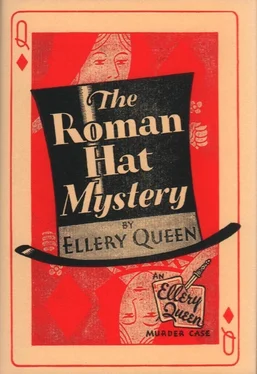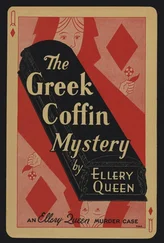“Aw, Inspector,” the Parson whined, “you ain’t pullin’ that stuff on me again, are you? How should I know? Field was one slick guy — he didn’t go around welching on his enemies. No, sir! I wouldn’t know... He was pretty good to me — got me off on a couple of charges,” he admitted unblushingly. “But I didn’t have no more idea he was here Monday night than — hell, than anything.”
The Inspector turned to Madge O’Connell.
“How about you, O’Connell?” he asked softly. “My son, Mr. Queen, tells me that on Monday night you confided in him about closing the exit doors. You didn’t say anything to me about that. What do you know?”
The girl returned his stare coolly. “I told you once, Inspector. I haven’t a thing to say.”
“And you, William Pusak—” Queen turned to the wizened little bookkeeper. “Do you remember anything now that you forgot Monday night?”
Pusak wiggled uncomfortably. “Meant to tell you, Inspector,” he mumbled. “And when I read about it in the papers it came back to me... As I bent over Mr. Field Monday night I smelled a terrible smell of whisky. I don’t remember if I told you that before.”
“Thank you,” remarked the Inspector dryly, rising. “A very important contribution to our little investigation. You may go, the whole lot of you...”
The orangeade boy, Jess Lynch, looked disappointed. “Don’t you want to talk to me, too, sir?” he asked anxiously.
The Inspector smiled despite his abstraction. “Ah, yes. The helpful purveyor of orangeade... And what have you to say, Jess?”
“Well, sir, before this fellow Field came over to my stand to ask for the ginger ale, I happened to notice that he picked up something in the alleyway,” said the boy eagerly. “It was shiny, sort of, but I couldn’t see it clear enough. He put it in his hip pocket right away.”
He concluded triumphantly, glancing about him as if to invite applause. The Inspector seemed interested enough.
“What was this shiny object like, Jess?” he inquired. “Might it have been a revolver?”
“Revolver? Gosh, I don’t think so,” said the orangeade boy doubtfully. “It was square, like...”
“Might it have been a woman’s purse?” interrupted the Inspector.
The boy’s face brightened. “That’s it!” he cried. “I’ll bet that’s what it was. Shined all over, like colored stones.”
Queen sighed. “Very good, Lynch,” he said. “You go home now like a good boy.”
Silently the gangster, the usherette, Pusak and his feminine charge, and the orangeade boy rose and departed. Velie accompanied them to the outer door.
Sampson waited until they had gone before he took the Inspector to one side.
“What’s the matter, Q?” he demanded. “Aren’t things going right?”
“Henry, my boy,” smiled the Inspector, “we’ve done as much as mortal brains could. Just a little more time... I wish—” He did not say what he wished. He grasped Djuna firmly by the arm and bidding Panzer, Neilson, Velie and the District Attorney a placid good night, left the theatre.
At the apartment, as the Inspector wielded his key and the door swung open, Djuna pounced on a yellow envelope lying on the floor. It had evidently been stuck through the crack at the bottom of the door. Djuna flourished it in the old man’s face.
“It’s from Mr. Ellery, I’ll bet!” he cried. “I knew he wouldn’t forget!” He seemed more extraordinarily like a monkey than ever as he stood grinning, the telegram in his hand.
The Inspector snatched the envelope from Djuna’s hand and, not pausing to take off his hat or coat, switched on the lights in the living room and eagerly extracted the yellow slip of paper.
Djuna had been correct.
ARRIVED SAFELY [it ran] CHAUVIN WILD WITH DELIGHT FISHING PROSPECT EXCEPTIONAL Stop THINK I HAVE SOLVED YOUR LITTLE PROBLEM Stop JOIN DISTINGUISHED COMPANY OF RABELAIS CHAUCER SHAKESPEARE DRYDEN WHO SAID MAKE A VIRTUE OF NECESSITY Stop WHY NOT GO INTO BLACKMAILING BUSINESS YOURSELF Stop DON’T GROWL DJUNA TO DEATH AFFECTIONATELY ELLERY
The Inspector stared down at the harmless yellow slip, a startled comprehension transmuting the harsh lines of his face.
He whirled on Djuna, clapped that young gentleman’s cap on his tousled head and pulled his arm purposefully.
“Djuna, old son,” he said gleefully, “let’s go around the corner and celebrate with a couple of ice-cream sodas!”
20
In Which Mr. Michaels Writes a Lecture
For the first time in a week Inspector Queen was genuinely himself as he strode cheerfully into his tiny office at the headquarters building and shied his coat at a chair.
It was Monday morning. He rubbed his hands, hummed “The Sidewalks of New York,” as he plumped down at his desk and briskly ran through his voluminous mail and reports. He spent a half-hour issuing instructions by word of mouth and telephone to subordinates in various offices of the Detective Bureau, studied briefly a number of reports which a stenographer placed before him and finally pressed one of a row of buttons on his desk.
Velie appeared at once.
“Howdy, Thomas,” said the Inspector heartily. “How are you this fine Fall morning?”
Velie permitted himself a smile. “Well enough, Inspector,” he said. “And you? You seemed a little under the weather Saturday night.”
The Inspector chuckled. “Let bygones be bygones, Thomas, my lad. Djuna and I visited the Bronx Zoo yesterday and spent a delightful four hours among our brethren, the animals.”
“That imp of yours was in his element, I’ll bet,” growled Velie, “among the monkeys especially.”
“Now, now, Thomas,” chided the Inspector. “Don’t be mistaken about Djuna. He’s a smart little whippersnapper. Going to be a great man some day, mark my words!”
“Djuna?” Velie nodded gravely. “Guess you’re right, Inspector. I’d give my right paw for that kid... What’s the program today, sir?”
“There’s a lot on the program today, Thomas,” Queen said mysteriously. “Did you get hold of Michaels after I telephoned you yesterday morning?”
“Sure thing, Inspector. He’s been waiting outside for an hour. Came in early, with Piggott hanging on his heels. Piggott’s been tailing him all over creation and he’s pretty disgusted.”
“Well, I always said a man’s a fool to become a policeman,” chuckled Queen. “Bring in the lamb.”
Velie went out, to reappear a moment later with the tall, portly Michaels. Field’s valet was dressed sombrely. He seemed nervous and ill at ease.
“Now, Thomas, my lad,” said the Inspector after he had motioned Michaels to the chair beside his desk, “you go out and lock that door and don’t let the Commissioner himself disturb me. Get that?”
Velie repressed a curious glance, grunted and departed. A few moments later a bulky figure was dimly discernible in silhouette through the frosted glass of the door.
At the expiration of a half-hour Velie was summoned by telephone to his superior’s office. He unlocked the door. On the desk before the Inspector reposed a cheap square envelope unsealed, a sheet of notepaper partly visible as it lay inside. Michaels was on his feet, pale and trembling, his hat crushed in two beefy hands. Velie’s sharp eyes noticed a generous ink stain on the fingers of the man’s left hand.
“You are going to take very good care of Mr. Michaels, Thomas,” said the Inspector genially. “Today, for instance, I want you to entertain him. I have no doubt you’ll find something to do — go to a movie — there’s an idea! In any event be friendly with the gentleman until you hear from me... No communication with anybody, Michaels, do you hear?” he added brusquely, turning to the big man. “Just you tag along with Sergeant Velie and play nicely.”
Читать дальше












